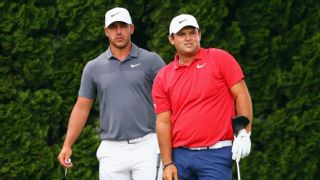|
CARNOUSTIE, Scotland -- Up front, you should understand that American golfers have a built-in advantage over their counterparts from around the globe. The game is defined by its four major championships and three of them are staged on U.S. soil, a truth cited once or twice by South African legend Gary Player, the one non-American to win the career Grand Slam. The Open Championship is the only road game on the schedule for the homegrown stars of the PGA Tour, an even better deal than the free luxury cars waiting for them at every stop. Imagine the Boston Red Sox playing five or six best-of-seven World Series games at Fenway Park, or the New York Yankees doing the same in the Bronx. Like life, the making of an international golfing legacy isn't fair. And this week, as a parade of young, gifted and already crowned Yanks rolls across Carnoustie, the international set might discover just how unfair this fight figures to be over the next 10 or so years. Since the start of the 2015 season, American players have won 10 of 14 majors and have gone 2-0 in the Presidents Cup and 1-0 in the Ryder Cup, a 2016 blowout at Hazeltine that signaled a seismic shift in the sport's power structure. Of greater consequence, two-time U.S. Open champ Brooks Koepka (age 28), Masters champ Patrick Reed (27), PGA champ Justin Thomas (25) and defending Open champ Jordan Spieth (24) arrive at Carnoustie as the first group of Americans in their 20s ever to have won five consecutive majors, according to ESPN Stats & Information. Spieth said Monday that better competition on the junior and amateur circuits created this wave of young and restless pros who have taken the sport by the throat. "So maybe when it took five years to transition guys into winning ten, fifteen years ago, it's taking guys five months now," Spieth said. "And therefore whether it's five times faster, ten times faster ... you're that much quicker and more well-prepared for majors. And so it's a natural transition into fearless golf at the highest level. I think that's what you're kind of seeing out of 20-something-year-olds." Funny how these things work out. Tiger Woods is arguably the greatest player of all time (and inarguably among the two greatest players of all time), and as Woods chases a 15th major title at the grand old age of 42, the generation that followed him has built the foundation of a staggering U.S. dynasty. "The generation that grew up idolizing Tiger," said Claude Harmon III, Koepka's swing doctor and son of the man (Butch) who coached Woods in the early years.  Harmon also works with the world's top-ranked player, Dustin Johnson, who is only 34 and is among the Americans who make up three of the world's top four and five of the world's top seven (Rickie Fowler, 29, is No. 7). "Tiger and Phil Mickelson couldn't be the standard-bearers forever," Harmon said. "With the amount of young American players under 30 who have won majors, I think we're in a very healthy place in golf right now. "I think this younger generation is very different from the older guard. We don't have guys now who are like Lanny Wadkins, Raymond Floyd and Curtis Strange, guys who were mean and tough and like enforcers in hockey. This younger generation is very close on and off the course, and they root for each other, and some of the older guys don't quite understand it. It's not a knock on either generation, it's just different. It's great for the game when guys see their friends winning majors, peers they spend a lot of time with, and they say, 'Hey, I travel with this guy. I do the same thing he does. I feel I can win one of these, too.'" Two decades ago, the last time Americans of any age won five consecutive majors, Justin Leonard was the only member of the foursome (Mark O'Meara, Davis Love III and Lee Janzen) who was in his 20s. The youth of the current titans suggests that a period of unprecedented domination is a realistic possibility. Spieth already owns three legs of the Grand Slam, and last year's great escape in the Open Championship at Royal Birkdale likely exorcised the ghosts of his 2016 Masters meltdown and freed him -- once his incomparable putting stroke returns -- to chase more majors without trepidation. Koepka has the U.S. Open thing down pat, no matter how many unforced errors the USGA commits against itself. As a prospect who once hardened himself overseas -- he won in Spain, Italy, Scotland, Turkey and Japan -- he is likely to be a threat at many Open Championships to come. Thomas, the world's No. 2 player, does not have the swing or disposition of a one-hit wonder. Reed, America's answer to Ian Poulter in the Ryder Cup, proved at Augusta National that he didn't have any Poulter-like trouble closing out a major. Johnson is a physical freak who can't possibly end his career with only one big trophy (can he?), and Fowler still seems more likely to win multiple majors than he is to go 0-for-forever. "I am really impressed by these young American players," Tom Watson, eight-time major winner and five-time Open winner, said by phone, "because they've shown me they really do have great golf swings and can play under pressure. And especially in the era of social media, I'm very excited about how a younger generation is being attracted to the game because of these young players winning and being in the spotlight. "But I think if you look at the total history of it, it's cyclical. You look at the previous non-American cycle -- Rory McIlroy and Jason Day and Graeme McDowell and Justin Rose and Louis Oosthuizen -- and then before then you go back to Tiger Woods' domination, and how he sucked the air out of major championship competition. You can't project that far out in the future with these young Americans. They have to deal with family and having children, injury and desire. Desire is the most important factor of all, and money corrupts desire." The top U.S. players have already earned more money on and off the course than they can ever spend. Is it possible that a perk-filled life of extreme wealth will compromise their willingness to continue chasing greatness and throw open the door to hungry and talented Euro 20-somethings who have yet to win a major -- Jon Rahm, Tommy Fleetwood, Thomas Pieters and Matthew Fitzpatrick? Is it possible that a number of the young Americans lording over the game today could suddenly lose their touch around the greens tomorrow, rarely to be heard from again?  "Johnny Miller had a meteoric career in the middle 1970s," Watson recalled, "when he was the best by far. But then it just ended." If the Americans begin to falter, McIlroy would still be the most likely beneficiary. He's won four majors before his 30th birthday, and though his drought feels biblical, he hasn't even gone four full years since winning The Open and the PGA three weeks apart. Harmon said he would be stunned if McIlroy remained stuck on four, and if 23-year-old Rahm and 27-year-old Fleetwood, in particular, didn't break through in the coming years. But Harmon doesn't see the U.S. contingent falling off, either. He noticed a profound difference in Koepka's demeanor as he approached his second U.S. Open title relative to the first go-round. Big-game winning breeds confidence, which breeds more big-game winning. "And I think the way the majors are played now is very different than with past generations," Harmon said. "You used to never expect guys like Dustin Johnson and Brooks to win U.S. Opens back in the day, when you had very steady, super competitive guys who made a bunch of pars winning, like Curtis Strange and Lee Janzen. People didn't think Spieth had the game to win at Augusta National, but across the board this generation of younger players do what they do in the majors. They don't care what the tournament demands historically, or what it says they have to do. They just play and enforce their game on the tournament." Spieth spoke of a potential piece of luck, what he called an "extremely strong class of players out of the United States in my graduating high school class (2011) and the classes right around us," an age group he said likely compares favorably to "any other class in the history of the game." That's why there's been no drop-off in American men's golf like there was in American men's tennis after Pete Sampras and Andre Agassi retired with a combined 22 titles in Grand Slam events. Woods and Mickelson are still around, and still hoping for one more magical Sunday, but a chief reason they're planning a $10 million, winner-take-all exhibition match is the brilliance and resilience of the young stars who have marginalized them (to an extent) in the game's four biggest tournaments. Not that any member of the Spieth-Koepka-Thomas-Reed group will approach Woods' 14 major victories, or even reach double figures, before calling it a day. "I just don't think we'll see that happen," Harmon said. "The next Phil Mickelson -- that's a realistic goal. Who's going to be the first of this generation to get to five?" At Carnoustie, this generation will try to get to six -- six consecutive majors won by Americans in their 20s. If one of the young Yanks does prevail at The Open, nobody will be talking about home-field advantage for the red, white and blue. Everybody will be talking about grim days ahead for the rest of the golfing globe.
|

